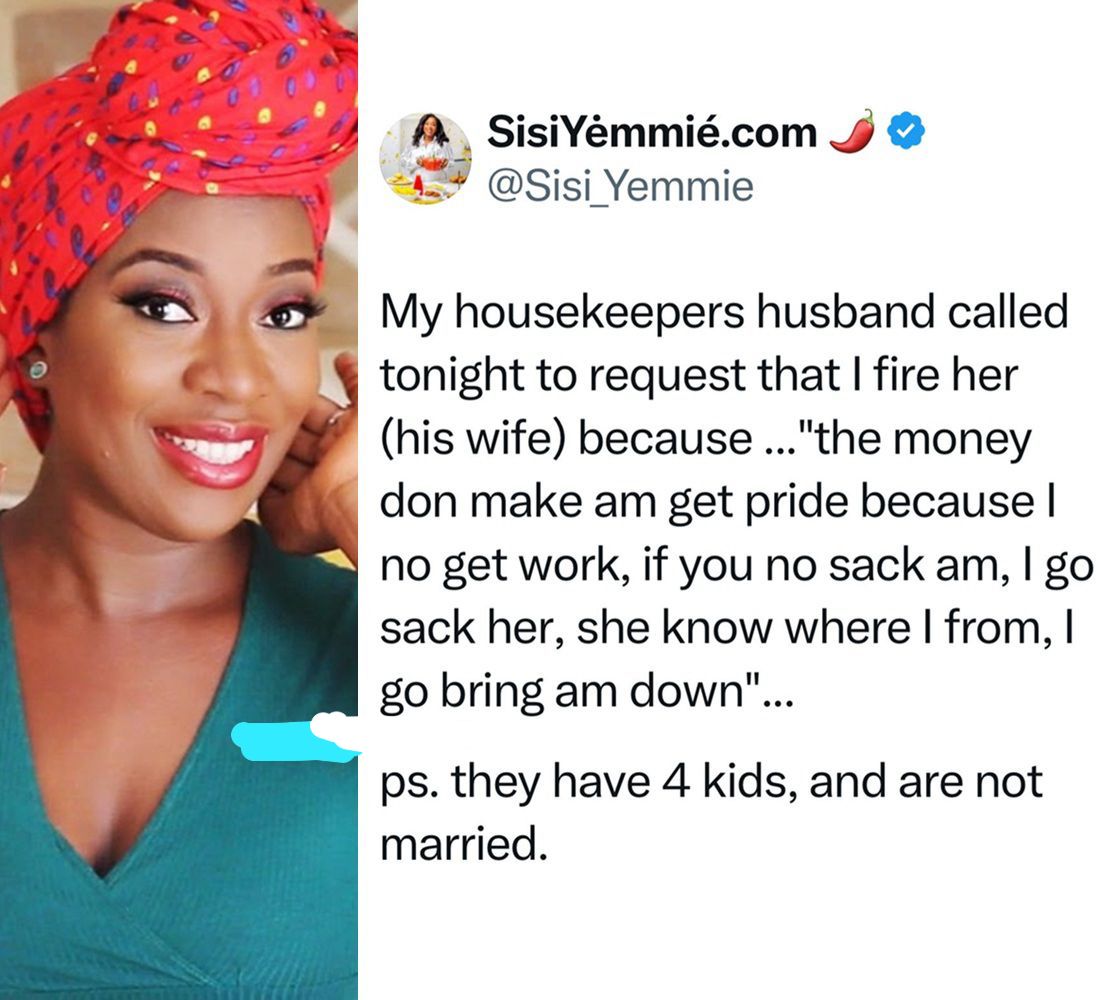
Chef Sisi Yemmie Shares Shocking Story of Housekeeper’s Husband Demanding She Be Fired Over 'Pride'

Popular Nigerian food blogger and YouTube sensation Sisi Yemmie stunned her fans and followers this week with a shocking revelation that stirred intense conversations online about gender dynamics, financial power, and domestic relationships. In a late-night post that quickly went viral, Sisi Yemmie shared a troubling encounter involving her housekeeper's husband, who boldly called her to demand that she fire his wife, citing her newfound "pride" due to her income as the reason.
According to Sisi Yemmie, whose real name is Yemisi Odusanya, the unexpected call came in the evening when the housekeeper’s husband rang her phone and launched into a startling request. He insisted that the money his wife was now earning from her job had given her an attitude of pride because he himself was unemployed. "The money don make am get pride because I no get work," the man reportedly said, lamenting that her ability to earn had shifted the balance of power in their relationship. He then issued an audacious ultimatum: "If you no sack am, I go sack her. She know where I from, I go bring am down."
The gravity of the man's words hung heavily over the internet as thousands of people rushed to comment and react. Many were horrified by the implied threat in his statement and the disturbing sense of entitlement he expressed over his partner’s employment and autonomy. Sisi Yemmie also noted an important detail that amplified the seriousness of the situation: the couple is not married, yet they have four children together. This revelation led to an outpouring of emotions from the public, with users expressing concern not only for the housekeeper’s job but for her safety and well-being.
In true internet fashion, the story ignited a firestorm of discussions around deeply rooted issues that often simmer beneath the surface in many homes across Nigeria and beyond. One of the most pressing topics was the fragile nature of male ego when faced with financial imbalance. Traditionally, men have been seen as providers, and when women begin to shoulder financial responsibilities, it sometimes sparks resentment, insecurity, or even violence, as evidenced by the threatening tone of the man’s call.
Social media users also pointed out how economic hardship in the country has increasingly forced women into breadwinning roles, and how society often fails to prepare men to navigate those changes with maturity and respect. For many, the story hit close to home, with some women sharing similar experiences where their success or independence became a source of conflict rather than pride within their relationships.
The audacity of the man’s demand, asking an employer to terminate his partner’s employment simply to soothe his bruised ego, was seen as not just selfish but also dangerous. Many were quick to advise Sisi Yemmie to take precautions, noting that the man’s comment about "bringing her down" could be interpreted as a threat of physical violence. People urged her to alert the housekeeper discreetly, consider providing support, and even involve authorities if necessary to ensure her employee’s safety.
At the heart of the outrage was also a deep sympathy for the housekeeper, a woman trying to do right by her four children in a tough economy, only to face sabotage from someone who should have been her biggest supporter. Her attempt to earn a decent living and maintain stability for her family was now being used against her, a stark reminder of the many unspoken battles women fight in their homes and workplaces every day.
Meanwhile, others seized the moment to highlight the urgent need for societal change. Commentators stressed the importance of educating men about gender equality, healthy relationships, and emotional intelligence. They also advocated for legal protections for domestic workers, who are often vulnerable not just to abuse from employers, but from their own family members when their employment status shifts power dynamics at home.
Despite the gravity of the situation, Sisi Yemmie’s followers praised her for bringing the matter to light. Known for her warmth, humor, and vibrant content centered around food and family life, Sisi Yemmie has built a trusted online community over the years. By sharing this experience, she not only opened the door for important conversations but also demonstrated a sense of responsibility towards her staff that many found admirable.
Throughout the online debate, a recurring sentiment was clear: a woman working hard to support her children should not be punished for her resilience. If anything, she should be celebrated. It was a stark indictment of toxic masculinity and a rallying call for more women to be protected and empowered to thrive without fear of intimidation or sabotage.
As the story continued to spread, many followers offered practical suggestions to Sisi Yemmie on how to handle the delicate situation. Some recommended helping the housekeeper secure alternative accommodation or legal protection if necessary. Others suggested setting clear boundaries with the husband or even involving social services to ensure the woman and her children’s safety. It was evident from the reactions that the community was deeply invested in the housekeeper’s well-being and wanted to see her protected from any form of harm.
While Sisi Yemmie has not yet provided a follow-up on the steps she plans to take, the overwhelming support from her audience has been unmistakable. Many are eagerly awaiting updates, hoping the housekeeper can continue her work safely and perhaps even find new opportunities to break free from the toxic environment she seems to be caught in.
This startling incident has served as a wake-up call about the silent struggles that often accompany women’s pursuit of financial independence, especially in settings where outdated gender expectations still hold strong. It also shows the power of storytelling in exposing uncomfortable truths and rallying communities towards change.
One thing remains certain: the courage to speak up, as Sisi Yemmie did, not only highlights the hidden battles many face but also sparks the kind of collective awareness and action that can lead to a safer, more equitable society for all.


